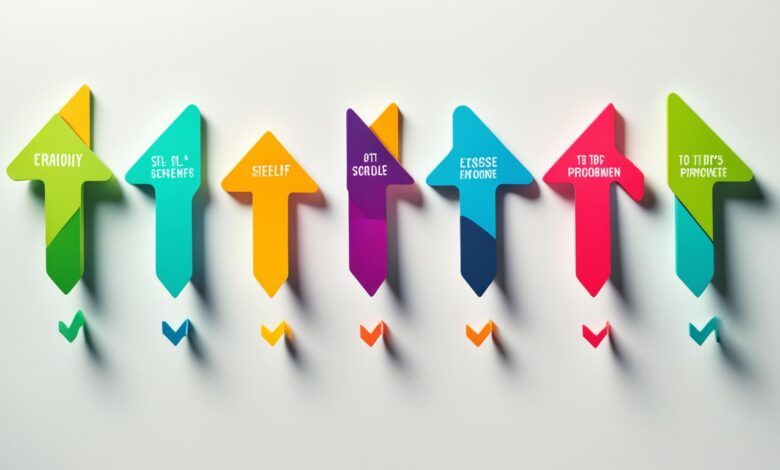11 Tips for Self Improvement to Motivate Yourself

Have you ever embarked on a journey to better yourself, only to find yourself lacking the motivation to continue? We’ve all been there. The initial excitement and drive gradually fade away, and we’re left feeling discouraged and unsure of how to move forward.
But here’s the good news: there are science-backed strategies that can help you stay motivated and achieve your goals efficiently. Whether you’re looking to boost your motivation, enhance your self-esteem, or build self-confidence, these tips will provide you with the tools you need to ignite that fire within and keep it burning.
Imagine waking up every day with a sense of purpose, excitement, and determination. Picture yourself reaching new heights and becoming the best version of yourself. It’s not just a dream—it can be your reality if you’re willing to put in the effort and apply these strategies to your life.
So, let’s dive in and discover the power of self-motivation and personal development. Are you ready to take the first step towards a more fulfilling and successful life?
Key Takeaways:
- Setting a target date for your goal can boost motivation and help you stay on track.
- Transforming your goal into a habit increases consistency and primes your mind for success.
- Plan for obstacles that may arise and devise strategies to overcome them using the WOOP technique.
- Break your big goal into smaller, more manageable goals to build momentum and celebrate frequent small successes.
- Tracking your progress allows you to measure success and stay focused on your goals.
Put your goal on the calendar
One key strategy to stay motivated and track your progress is to put your goal on the calendar. By setting a specific target date for achieving your goal, you create external motivation that can boost your internal drive. Whether it’s a test, a degree, or a race, mark the date on your calendar as a milestone to work towards.
Visualizing your goal on the calendar helps keep it at the forefront of your mind and serves as a daily reminder of why you’re working hard. It adds a sense of urgency and purpose to your efforts, making it easier to stay motivated and focused.
Having a target date also provides a tangible timeframe to evaluate your progress. You can break down your goal into smaller tasks and track your progress as you complete each one. This way, you can celebrate each milestone and stay motivated by witnessing the progress you’ve made.
Putting your goal on the calendar also helps with planning and time management. By allocating specific time slots for working towards your goal, you can prioritize it among your other responsibilities and commitments. This ensures that you dedicate regular time and effort towards your goal, even when life gets busy.
Remember, a goal without a deadline is just a dream. By putting your goal on the calendar, you transform it into a concrete target that drives you to take action, stay motivated, and track your progress.
“Setting a target date for your goal gives you something specific to work towards and helps you track your progress more effectively.”
| Benefits of Putting Your Goal on the Calendar | How it Enhances Motivation |
|---|---|
| Creates external motivation | Inspires internal drive by providing a tangible target |
| Helps track progress | Motivates by visualizing and celebrating milestones |
| Improves planning and time management | Prioritizes goal and ensures regular effort |
Make working toward your goal a habit
Turning your goal into a habit is a powerful way to stay motivated and achieve long-term success. By incorporating consistent actions into your daily routine, you can create positive momentum and make progress towards your goal effortlessly. Here’s how:
1. Use an “if-then” plan
One effective strategy to make working towards your goal a habit is to create an “if-then” plan. This involves linking a regular activity or trigger with a specific task related to your goal. For example, if your goal is to exercise more, you could say, “If it’s 6 a.m., then I will go for a run before breakfast.” By associating a specific action with a specific cue, you build consistency and make it easier to follow through.
2. Start small with manageable tasks
Consistency is key when it comes to forming habits. To ensure success, start with small actions that are easily achievable. Break down your goal into manageable tasks that you can incorporate into your daily routine. By starting small and gradually increasing the complexity or duration of the tasks, you build confidence, create positive reinforcement, and develop a habit that sticks.
3. Prime your mind for success
Consistently taking small actions towards your goal primes your mind for the bigger goal. Each action reinforces the belief that you’re capable of achieving your objective. Over time, this positive reinforcement strengthens your motivation and self-confidence, making it easier to stay focused and committed to your goal.
“The secret of your future is hidden in your daily routine.” – Mike Murdock
By making working towards your goal a habit, you create a powerful mechanism for motivation and progress. Consistent actions, supported by an if-then plan and starting small, allow you to build momentum and prime your mind for success. Incorporate these strategies into your routine and watch as your goal becomes an effortless part of your everyday life.
| Action Steps | Benefits |
|---|---|
| Use an “if-then” plan | – Increases consistency – Provides a clear roadmap |
| Start small with manageable tasks | – Builds confidence – Creates positive reinforcement |
| Prime your mind for success | – Strengthens motivation – Enhances self-belief |
Plan for imperfection
Maintaining motivation and staying on track towards your goals can be challenging when obstacles arise. It’s essential to anticipate and plan for these obstacles to ensure they don’t derail your progress. By proactively identifying potential obstacles and developing strategies to handle them, you can maintain your motivation and continue moving forward.
One effective technique for planning for imperfection is the WOOP technique. The WOOP technique stands for Wish, Outcome, Obstacle, and Plan. It helps you visualize your goals, envision the positive outcomes, identify potential obstacles, and create an actionable plan to handle them.
Using the WOOP Technique
To apply the WOOP technique:
- Wish: Start by clearly defining your wish or goal. What is it that you want to achieve?
- Outcome: Envision the positive outcome of achieving your goal. How will it impact your life? What benefits will it bring?
- Obstacle: Anticipate the obstacles that may arise along the way. What challenges could potentially hinder your progress?
- Plan: Develop a plan to overcome these obstacles. How can you navigate around them? What steps can you take to handle setbacks effectively?
By going through this process, you are better prepared to handle obstacles, regardless of whether they are internal or external. It allows you to take a proactive approach, replacing uncertainty with a well-thought-out plan.
Remember, obstacles are unavoidable on the path to success. Embrace them as opportunities to grow and learn, rather than as reasons to give up. With careful planning and the right mindset, you can overcome any obstacle that comes your way.
Stay motivated and focused on your goals, even when faced with challenges. Let nothing stand in the way of your success.
Example Table:
| Obstacle | Strategy |
|---|---|
| Lack of time | Break down tasks into smaller, manageable chunks and prioritize your time effectively |
| Procrastination | Create a schedule with deadlines and hold yourself accountable. Use techniques like the Pomodoro Technique to stay focused. |
| Negative self-talk | Practice positive affirmations and surround yourself with supportive people who inspire and motivate you. |
| Lack of resources | Seek alternative solutions, collaborate with others, or explore creative ways to obtain the necessary resources. |
Set small goals to build momentum
When tackling a big goal, it can often feel overwhelming and difficult to maintain motivation. That’s where setting small goals can make a big difference. Breaking down your larger objective into smaller, more manageable tasks allows you to build momentum and keep your motivation high.
By focusing on accomplishing these smaller goals, you not only make progress toward your ultimate objective but also experience frequent small successes along the way. Celebrating these milestones, no matter how small, can give you a sense of achievement and boost your motivation to keep going.
One effective strategy is to set goals at the start of a new week, month, or year. Use this time to reflect on your progress, reassess your priorities, and set new goals that align with your larger objective. This periodic goal-setting practice helps maintain focus and provides a natural boost of motivation.
Small Goal Examples:
- For a fitness goal: Aim to walk an extra 500 steps each day this week.
- For a career goal: Complete one online course related to your field each month.
- For a personal development goal: Practice a new language for 15 minutes every day this month.
Remember, the key is to set goals that are realistic and attainable within a reasonable timeframe. This allows you to experience frequent successes and maintain a positive momentum towards your larger goal.
So, set those small goals and watch as they build momentum, boost your motivation, and pave the way for long-term success.

Track your progress
Monitoring your progress towards your goals is crucial for staying motivated on your journey of self-improvement. By tracking your progress, you can measure success, stay accountable, and make necessary adjustments along the way. Here are some effective tools for tracking your progress and staying motivated:
1. To-Do Lists
Create a daily or weekly to-do list that outlines the specific tasks you need to accomplish. As you tick off each task, you visually see your progress and experience a sense of achievement. Consider using digital tools like Todoist or Wunderlist to conveniently track your tasks and stay organized.
2. Calendar
Integrate your goals and milestones into your calendar. Assign specific dates and reminders to keep yourself on track. Seeing your goals on the calendar helps you prioritize tasks and visualize your progress over time. Try using Google Calendar or Outlook to manage and track your goals effectively.
3. Digital Tools
Leverage digital tools specifically designed for goal tracking and habit formation. Platforms like Trello and Asana offer visual boards and progress trackers, allowing you to break down your goals into manageable tasks and monitor your progress. These tools provide a clear overview of your accomplishments and motivate you to keep moving forward.
Tracking your progress is like a road map that guides you towards your destination. It serves as a visual reminder of how far you’ve come, keeping you motivated to push ahead.
4. Visual Reminders
Utilize visual reminders to keep your goals at the forefront of your mind. Create a vision board with inspiring images and quotes that represent your aspirations. Display it in a prominent place where you spend a lot of time, such as your workspace or bedroom. These visual cues serve as constant reminders of what you’re working towards, reinforcing your motivation and commitment.
Remember, tracking your progress is not only about measuring success but also celebrating the milestones you achieve along the way. It allows you to reflect on your growth and provides a sense of accomplishment that fuels your motivation to keep going. So, find the tracking tools that work best for you, stay consistent, and embrace the power of visual reminders.
Learn more about how to stay motivated on your journey of self-improvement.
| Key Benefits of Tracking Your Progress | Tools for Tracking Progress |
|---|---|
|
|
Reward yourself for the little wins as well as the big ones
Rewarding yourself for reaching milestones and completing goals, no matter how small, can boost your motivation and increase your interest and enjoyment in the work you’re doing. Celebrating your progress along the way helps to validate your efforts and keeps you motivated to continue striving for success. Small rewards have the power to make a big impact on your overall satisfaction and drive.
It doesn’t have to be expensive or extravagant. Simple rewards can be just as effective in boosting interest and enjoyment. Take a break and indulge in a moment of relaxation, treat yourself to your favorite snack, or spend some time engaged in a hobby that brings you joy. These small rewards not only celebrate your accomplishments but also serve as a reminder of the progress you’ve made.
By incorporating small rewards into your journey towards your goals, you create a positive cycle of motivation and reinforcement. Each milestone becomes an opportunity to celebrate success and reignite your passion for achieving even more. This approach helps to break up the challenges of the journey, making it more enjoyable and satisfying along the way.
Remember, the journey towards your goals is not only about the destination but also about the experiences, growth, and personal fulfillment that comes with it. Embracing the power of rewards enhances your motivation and makes the entire process more rewarding and enjoyable. So, go ahead, reward yourself for your efforts big and small, celebrate your success, and keep the motivation rolling. You deserve it!
Embrace positive peer pressure
Surrounding yourself with positive and supportive people can be a great motivator on your journey to self-improvement. By embracing positive peer pressure, you can harness the power of team support, goal sharing, and accountability to propel yourself forward.
Joining a team, study group, or professional organization can provide the support and camaraderie you need to stay motivated, even if you’re working on your goals alone. Being part of a community that shares similar aspirations and challenges can boost perseverance, engagement, and performance.
Sharing your goals with someone whose opinion you value can also strengthen your commitment and accountability. By verbalizing your aspirations to a trusted individual, you create a sense of responsibility to follow through and make progress. This person can serve as a sounding board, offering guidance, encouragement, and valuable insights along the way.
Remember, embracing positive peer pressure does not mean blindly conforming to others’ expectations. Instead, it is about surrounding yourself with individuals who uplift and inspire you to reach your full potential. Together, you can celebrate successes, navigate obstacles, and cheer each other on as you pursue your personal development goals.
So, don’t underestimate the power of team support, sharing goals, and accountability. Embrace positive peer pressure and unlock the collective energy and motivation that comes from being part of a supportive community on your journey to self-improvement.
Benefits of Embracing Positive Peer Pressure:
- Increased motivation and perseverance
- Enhanced engagement and performance
- Access to guidance, encouragement, and valuable insights
- A sense of accountability and responsibility
- Celebration of successes and support during challenging times
Surround yourself with only people who are going to lift you higher. – Oprah Winfrey
Conclusion
Maintaining self-motivation for self-improvement is a continuous journey. It’s natural to experience highs and lows along the way, but with the implementation of these 11 tips, you can stay motivated and efficiently achieve your goals. From setting target dates and creating habits to planning for obstacles and rewarding yourself, these strategies will help you stay on track and stay motivated throughout your self-improvement journey.






